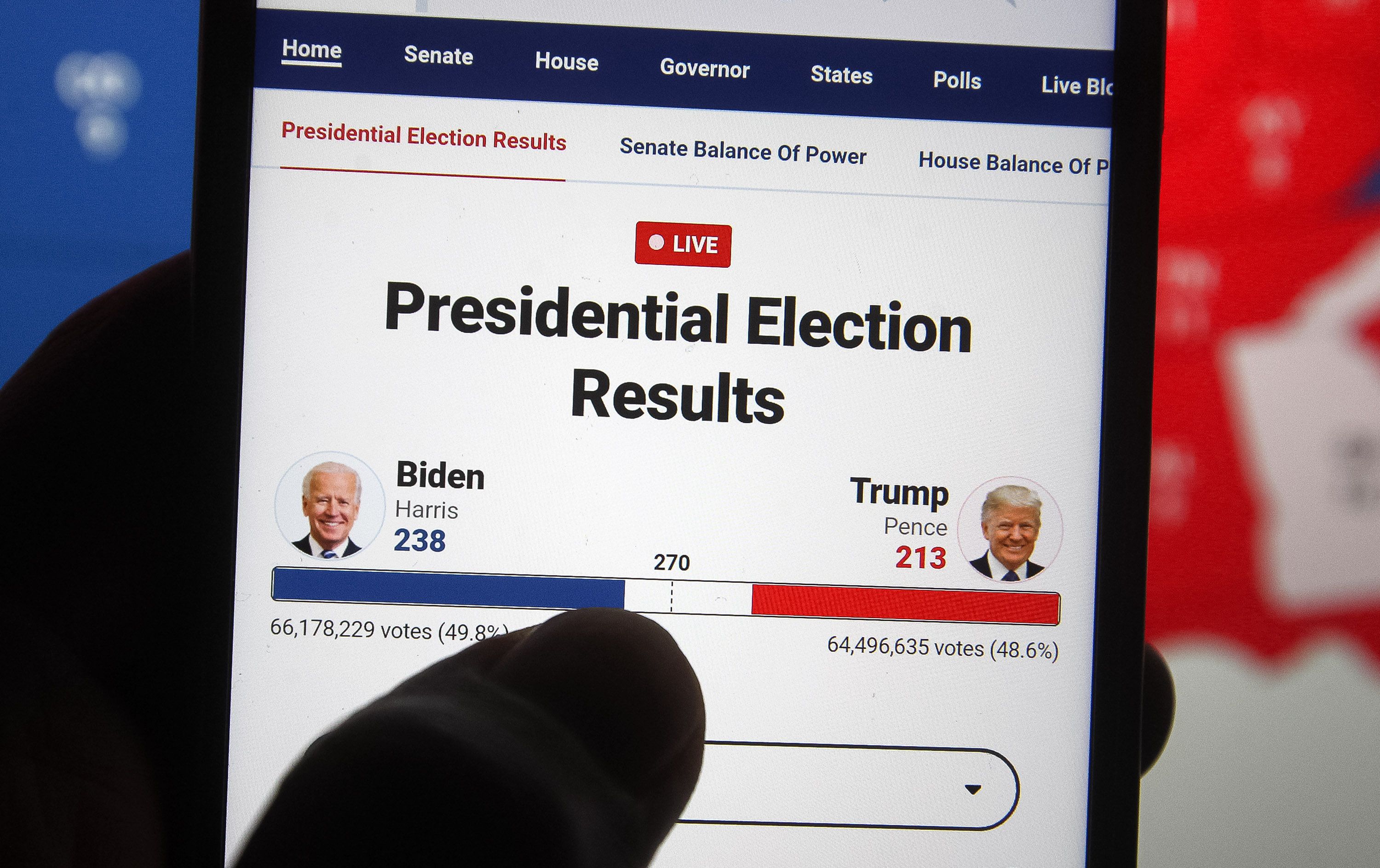Uncertainty as World Waits on U.S. Elections Results

What is the outcome?
The results from states where all votes have already been counted have yielded a near-equal Electoral College vote total (Biden leads in the nationwide popular vote). Based on results in which the vast majority of votes have been counted, Joe Biden has won 19 states and the District of Columbia, collecting a total of 238 electoral votes out of the 270 required to win. Of the 12 states most crucial to winning this year’s election, Biden was victorious in Arizona and New Hampshire. Trump, in turn, has won 216 electoral votes from 25 states, including Florida, Iowa, Ohio, and Texas. The winner will be determined by the results from the remaining key states—Georgia, North Carolina, Michigan, Nevada, Pennsylvania, and Wisconsin—which for the most part are now counting mail-in votes and combined have 83 electoral votes.
Where does the uncertainty about the result originate?
This year’s election saw a surge in mail-in votes, largely because of the pandemic, so the counting of more than 90 million such ballots will take longer than usual, meaning final results may not be known for a few more days. Based on where things stand and estimates of the remaining uncounted ballots, Biden still has a better chance of winning those states because mail-in votes were more often cast by Democratic Party voters. The results from the ballots counted so far (5 p.m. CET 4 November) give Biden a slight advantage in Michigan, Nevada, and Wisconsin, but Trump still has a chance of winning via Georgia and North Carolina, and overtaking Biden in Michigan. If this scenario unfolds, the fight for the presidency may come down to Pennsylvania—where Trump leads—which also requires the most time of the remaining states to finish counting ballots, thus the election may remain uncalled until it is done. Without results from Pennsylvania, probably neither candidate will have the required 270 votes. No matter who wins in Pennsylvania, the opponent is likely to protest the results and appeals could take it to the Supreme Court.
What’s next in the U.S. election process?
While the states continue to count ballots, the candidate’s staffs will focus on possibly challenging the results where they can and requesting recounts. On election night, Trump declared he had won states where the final results hadn’t yet been announced and stated that he would be petitioning the Supreme Court to stop counting mail-in ballots (technically, it would be an appeal from lower courts first). Uncertainty as to the results of the elections and possible attempts to influence it through administrative and court proceedings may lead to an escalation of public unrest. This could result in a period of internal instability in the U.S., weakening the Trump administration and making the process of handing over power to the Biden administration very difficult.
What is the outcome of the Congressional elections?
Despite some losses, the Democrats managed to retain a majority in the House of Representatives. The Senate, however, is likely to remain under the control of the Republicans, although it is uncertain what majority they will have. There are pending Senate seats from Georgia, where there will be a runoff election on 5 January, and in North Carolina and Maine. If the Republicans hold onto the Senate, that will allow them to influence the political initiatives of a future President Biden, probably through a policy of obstruction. If Trump wins, he can continue to count on Republican support for his policies. It is possible, however, that the balance of seats in the Senate will be split 50–50, which gives the vice president the deciding vote. In that case, the results of the presidential election will have a direct impact on the Senate’s work until at least the midterm elections in 2022.
How will the election affect U.S. foreign policy?
Until a winner is known, U.S. foreign policy activity is expected to be reduced. If Biden wins, the new administration will have to be formed during the transition period until January, which Trump is expected to try to hinder. However, for either Biden or Trump, the rivalry with China will remain the main challenge. The next administration will be forced to work with Congress, which has cross-party consensus on China’s role as a threat to American economic and political interests. To achieve its goals, the next administration will have to strengthen relations with U.S. allies. However, this will not be at the expense of abandoning the pressure to increase defence spending within NATO or allies’ participation in American economic initiatives or those related to the promotion of international dialogue and respect for human rights.



